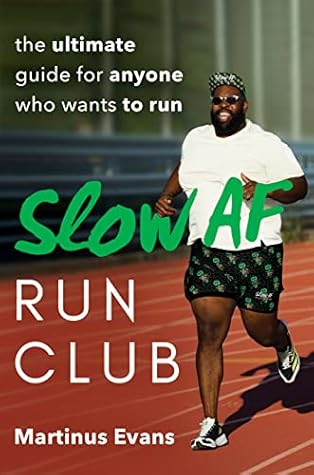More on this book
Kindle Notes & Highlights
Read between
February 20 - February 28, 2025
Runners who aren’t running to win, but to celebrate their bodies. Runners who run because they can.
There are so many benefits to running: it helps you feel good, bond with friends/family/pets, get your steps for the day quickly, sleep better, build strong bones and muscles, improve your cardiovascular health, and boost your mental health. The list goes on and on. Running really has nothing to do with a number on a scale or a time on a stopwatch.
Running is a struggle of the mind. It’s literally you versus the thoughts in your head versus other people’s thoughts of you versus the thoughts in your head about other people’s thoughts of you.
Your mindset is EVERYTHING. When the chips are down, what makes a runner a runner is more than athletic ability. It’s how you decide to handle your challenges.
As long as your legs are moving faster than when you’re walking, then you are running.
You run? You have the desire to run? The second you step out the door, you’re a runner. Plain and simple.
Not everything you think is true, and not everything you feel is real.
Becoming an athlete requires you to see your thoughts and emotional processes from the outside. That way you can observe them with some distance. Why is this important? It can help you alter your thoughts and your emotional experiences. You can turn negative thoughts into positive ones and losses into wins.
The body that you have today is the body that you have today. You can do only what you can do today. You can’t worry about yesterday, ten years ago, or the point at which you were your smallest (or heaviest) in high school. We need to focus only on the present moment.
So despite the feelings and voices from the past that might be dragging you down, you need to remember this: everyone has a day zero (or even multiple day zeros) and that doesn’t say anything about you morally.
No struggle, no progress
Your race, your pace
The mind gives up long before the body needs to
Everything is unrealistic until it’s not. Delusional self-belief is just that: believing in yourself no matter what because you know, deep down, it can be true.
You have to be the first person who thinks that you’re going to achieve what you’ve set out to do.
This is also the main reason many people are in awe of runners. You tell a non-runner you went for a run, and they’re likely picturing an all-out sprint. NAH, that is not the way it goes.
Get to the distance that you want to run first, and then go back to work on speed. That will help you build consistency.
Make sure you run with at least a 1 to 2 percent incline on the treadmill; this setting will give you a feeling similar to running outside. Watch some TV or run to music, and your miles can fly by quickly.
I have a 1-mile route, 5K route, 5-mile route, and 10-mile route already mapped out around my neighborhood. I spent quite a bit of time planning them out so that when it’s time to run I don’t have to think about where I’m going.
I wouldn’t add speed work to your training if you are an absolute beginner. Just run more and your body will get more efficient; then you will start to run faster naturally.
Taking breaks and planning for recovery make you more of an athlete than charging forward recklessly with your health.
“Rest is a part of training, it is not avoidance of training.”
What you eat on your days off matters just as much as what you eat on your running days.
Running can bring up tough shit and skeletons in your closet. It can bring up raw emotions, including doubt and anxiety.
It’s so easy to become obsessed with running. If you let it, running will consume you and become all that you think about, read about, and research.
If I don’t make time to cross-train, I will be making time for physical therapy and doctor visits.
In short, it’s non-running that makes you better at running. It’s key. Important. Unskippable.
In a perfect world, a trained-up runner should be running three to four days a week, cross-training two to three days a week, and resting for at least one day.
Running the New York City Marathon is a goal. Once you’ve run it, your goal is achieved. On the other hand, fully applying yourself as an athlete and runner is an example of a value—an ongoing process.
You do not rise to the level of your goals. You fall to the level of your systems.


